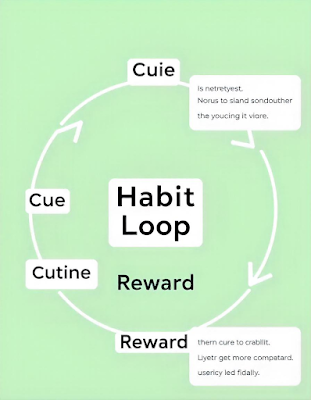Ever tried to build a new habit, only to find yourself back in the same old routine within a week? You’re not alone. We all have that one thing we’ve sworn to change—whether it’s going to the gym, eating healthier, or learning a new skill—yet it feels like we’re battling against ourselves. Developing positive habits isn’t just about discipline or willpower, it's about strategy. And once you nail the strategy, you can transform your life, one habit at a time.
In this guide, we’ll walk through practical, problem-solving techniques to build habits that stick, even when motivation fizzles out. Along the way, I’ll share personal experiences, engaging humor (because hey, who doesn’t need a little laugh while trying to get their life together?), and actionable tips that can help you overcome the barriers holding you back.
1. The Habit-Loop: Understanding the Science of Habits
Before diving into the "how," let’s first understand the "why" behind habits. You’ve probably heard of the habit loop: Cue → Routine → Reward. Sounds simple, right? The tricky part is breaking into or out of the loop.
Problem: The Old Habit Won't Let Go
Breaking old habits can feel like trying to stop a runaway train. Whether it's that late-night snacking habit or skipping your morning workout, it's easy to fall back into what’s comfortable.
Solution: Identify the Cue and Replace the Routine
Instead of focusing on the habit you want to eliminate, shift your attention to the cue. For example, if you’re snacking out of boredom every night at 10 pm, what is triggering that? Replace that routine with a different activity (maybe a cup of herbal tea or a short walk) and give yourself a similar reward.
Personal Tip: I used to procrastinate like a champ—always scrolling on my phone before bed, promising myself "just five more minutes." The cue? The moment I climbed into bed. My solution? I now place my phone across the room, forcing me to get up if I want to check it. Trust me, no one is going to leave their cozy bed for an Instagram notification.
2. Start Small: The Power of Micro-Habits
We’ve all set lofty goals—working out for an hour daily or reading a book every week. And then, three days in, we’ve already given up. Why? We aim too high too soon.
Problem: Overwhelm Kills Motivation
When we set overwhelming goals, our brain registers the task as stressful, and we end up avoiding it altogether.
Solution: Micro-Habits to the Rescue
The key is to start ridiculously small. Instead of saying, "I’ll meditate for 30 minutes every day," start with 2 minutes. Sounds absurdly easy, right? That’s the point. When something feels easy, you're more likely to do it consistently. Over time, you'll build up to those bigger goals without feeling overwhelmed.
Personal Example: I started with a goal of writing for just 5 minutes each morning. Five minutes turned into 15, which grew into a daily writing habit that now stretches over an hour. The secret? Start small, stay consistent, and let momentum build.
You must be read : Build long lasting relationship and network connections
3. The Magic of Habit Stacking
Another game-changing technique is habit stacking. This is when you attach a new habit to something you already do daily.
Problem: Forgetting to Do the New Habit
You know how it goes—you plan to start a new habit, but by the end of the day, you completely forget about it.
Solution: Stack the Habit on Top of an Existing Routine
Pick an action you already do daily (brushing your teeth, making coffee, etc.) and stack a new habit on top. For example, if you want to start journaling, do it right after you brush your teeth in the morning.
Example: I started habit stacking when I wanted to get into the routine of stretching every day. Instead of trying to find a new time slot in my busy schedule, I decided to stretch while waiting for my morning coffee to brew. It was 3-4 minutes that would’ve been spent standing around, and now it's productive.
4. Accountability: Get Others Involved
Sometimes, no matter how hard we try, self-motivation isn’t enough. This is where accountability comes into play.
Problem: Lack of Motivation Over Time
You start off strong, but after a few days, the excitement wears off, and your commitment fades.
Solution: Find an Accountability Partner
Whether it’s a friend, a family member, or a group of like-minded individuals, having someone else hold you accountable can make a huge difference. Share your progress with them, and let them cheer you on (or give you a nudge when you need it).
Funny Personal Story: I once had a "gym buddy" who I was convinced would help me stay on track. Little did I know, we ended up convincing each other to skip more workouts than we attended! Lesson learned: Choose an accountability partner who's serious about your success!
5. Track Your Progress (But Don’t Obsess Over Perfection)
Tracking progress is key to building habits, but here’s the catch: Don’t let perfectionism get in the way.
Problem: The All-or-Nothing Mentality
We often think, “If I miss one day, I’ve failed.” This mindset can derail progress when life inevitably throws us off track.
Solution: Track Your Wins, and Give Yourself Grace
Use a habit tracker (there are tons of apps) or a simple journal to mark each day you complete the habit. However, instead of focusing on streaks, focus on consistency over time. Missing a day here and there won’t ruin your progress, but quitting altogether will.
Personal Experience: I’ve kept a habit tracker for my writing routine. Some days I miss, but I always remind myself that it’s about the overall trend, not a perfect record. It’s helped me stay consistent without feeling guilty for the occasional off-day.
6. The 2-Minute Rule: Beat Procrastination
Ever feel like starting is the hardest part? The 2-Minute Rule is designed to help you overcome that.
Problem: Struggling to Start
When tasks seem too daunting, we often procrastinate. It’s not the task itself—it’s the mental barrier of starting.
Solution: The 2-Minute Rule
This rule suggests that if a task takes less than two minutes, do it immediately. For bigger tasks, commit to just two minutes. Often, once you start, you’ll naturally continue beyond those two minutes.
Personal Story: I dreaded cleaning up my workspace. It was always cluttered, and the idea of tidying up felt like a mountain to climb. One day, I set a timer for two minutes. Guess what? Once I started, I finished cleaning the whole desk. It’s all about getting the ball rolling.
7. The Power of Environment Design
Your environment plays a huge role in shaping your habits—often more than we realize.
Problem: Environmental Triggers Are Holding You Back
If your surroundings are filled with distractions, it’s no wonder you’re struggling to stick to your habits.
Solution: Make Your Environment Work For You
If you want to read more, place books around your living room or bedside. If you want to eat healthier, stock your fridge with nutritious options and keep the junk food out of sight (or out of the house entirely). Design your space to encourage good habits and make bad habits harder to follow.
Example: I used to struggle with drinking enough water throughout the day. My solution? I placed water bottles on my desk, in my car, and near my bed. Now, I have no excuse not to stay hydrated.
8. Celebrate Small Wins
It’s easy to get caught up in chasing big goals, but celebrating small wins is crucial for long-term success.
Problem: Waiting for Big Milestones Can Be Demotivating
When you only focus on huge milestones, it can feel like you’re not making progress, leading to frustration and burnout.
Solution: Celebrate Small Victories
Every step forward, no matter how small, is a win. Did you exercise for 10 minutes today? That’s a win. Did you choose a salad over fast food? Another win. Acknowledge these small achievements and let them fuel your motivation.
Conclusion: The Journey to Positive Habits
Building positive habits is a journey, not a sprint. It’s about making small, sustainable changes that accumulate over time, creating massive transformation. While it’s easy to get discouraged when things don’t go perfectly, remember that the key is to stay consistent, give yourself grace, and keep moving forward.
And hey, if all else fails, just remember: even the world's best personal development experts were once habit-breakers too. So, grab your favorite cup of coffee (or tea), get started with a micro-habit today, and watch how those small changes add up to something extraordinary. You’ve got this!
Call to Action:
Have a habit you're struggling to build or break? Share your experience in the comments below, and let’s tackle it together! Also, don't forget to subscribe for more practical tips to level up your personal development journey.10 Productivity Hacks Used by the Most Successful People in the World,




Osm bhaiii
ReplyDelete